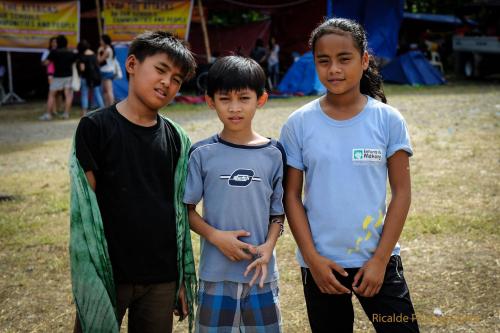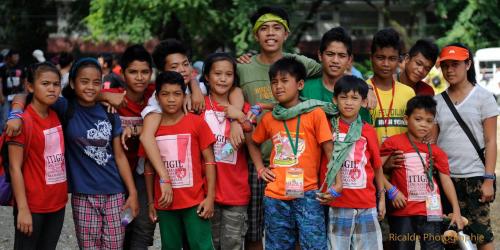
Gleeza Joy Belandres (right)

Gleeza Joy Belandres (right)
Gleeza Joy Belandres, 13, had just graduated from elementary with medals in academic excellence – Best in Agriculture and Reading subjects. She has just started her first year of high school at the Alternative Learning Center for Agricultural and Livelihood Development (ALCADEV), the school in her village in Han-ayan community.
Like other Manoboi youths of her village in Lianga, her whole future lies ahead of her. But it is one to be marked with hardship, tragedy and struggle.
ALCADEV is not just any school, it was the school that a Lumád girl like Gleeza Joy dreams of entering. She had been with other children from non-Lumád public schools, and had felt being looked down on, because she is a “Manobo.”
“They usually discriminate us, they do not want to play with us, because they say we stink and that our uniforms are old and torn,” she recalled.
ALCADEV, however, was founded by her elders organized under the group Malahutayong Pakigbisog Alang sa Sumusunod (Persevering Struggle for the Next Generation, or Mapasu) in Surigao del Sur. It primarily serves Lumád students, for free, and teaches Lumád tradition and culture, alongside science lessons by way of gardening and growing food.
“We learned to speak Tagalogii and English,” Gleeza Joy said.
Most of all, her friends in her community also study there. What more can she ask for?
“Everything that we eat comes from our harvest. From five to seven in the morning, we farm. Also from four to five in the afternoon, we farm again. What we plant, that is what we use in the dorm as our food; it feeds us and our teachers,” Gleeza Joy said.
But bucolic calm was shattered on September 1, 2015 when soldiers and the paramilitary men Magahat-Bagani came. The armed men killed ALCADEV Executive Director Emerito Samarca, her uncle Manobo leader Dionel Campos, the Mapasu chairperson, and Datu Juvello Sinzoiii.
Gleeza Joy was one of the hundreds who saw Campos stand before the paramilitary men and get shot in the head. The horror did not end there, as the school’s beloved teacher Samarca, whom they fondly call “Sir Emok,” was found dead, his throat slit open, and shot in the chest, inside the school’s guest house.
What followed was hours of trekking out of their mountain village and down to the city – an exodus of thousands of Lumád, pushed by fear, carrying the bodies of their dead.
At the evacuation center in Tandag City, Gleeza Joy joined other children in psycho-social activities, as well as regular classes, as ALCADEV teachers tried to bring back a sense of regularity, amid the trauma, and the fact that they are staying in tents in a stadium.
But Gleeza Joy is a child of Diatagon village, Lianga, Surigao del Sur where many of the staunchest Lumád leaders of Caraga came from. As in the Manobo tradition, not only the men lead, as datu, but also the women, the baiiv. Her mother, Imelda Belandres, is a council member of Mapasu, as well as many of her aunts.
“Women have every capacity to lead the community. Those in the community have learned to respect the women leaders, as well,” she said.
The Diatagon communities and other Lumád villages organized by Mapasu had taken a consolidated stand against the entry of coal mining and other encroachment into their ancestral lands, and for this, the population had been subjected to relentless operations and harassment, over which they have prevailed and remained united.
Her school, ALCADEV, has long been branded by government as “a training ground” for the New People’s Army, encamped by soldiers, who subject the teachers and students to various forms of intimidation.
Like all children of the Manobo communities of Diatagon, she had her share of leaving her home, living in evacuation centers,
Travelling to Manila as part of the Manilakbayan 2015v, her small world opened up as she met people from all over the country, other students and activists who are confronting sectoral issues and waging collective struggles. They have all expressed support to the calls of the Lumád: to stop the killings, stop the attacks on schools and communities, pull out soldiers and disband paramilitary groups.
“I’m happy because we were warmly welcomed, and I saw that we are not alone in the struggle, there are so many others,” she said.
It is joy that she brought back to the evacuation center where children like her will continue to face the harsh weather and anxieties of being away from their mountain home. And it is strength that she will hold on to, knowing fully well that she is next in line to the task of defending their lands.
“If I become a leader in our community, my dream is that we will be given a chance to develop our economy, politics, and culture through the cooperation and unity of all the members in our community,” said Gleeza Joy.
[i] Manobo refers to
one of the largest indigenous group occupying different parts of Mindanao. The term, Manobo, however, is a general
category. There are more than ten subgroups belonging in this category which,
despite several nuances, is similar in origin, language, general leadership
structures, and livelihood.
[ii] Tagalog is an Austronesian language with about 57 million speakers in
the Philippines, particularly in Manila, central and southern parts of Luzon,
and also on the islands of Lubang, Marinduque, and the northern and eastern
parts of Mindoro.
[iii] Refer to link:
[iv] Bai is a term
increasingly used as reference to women leaders in indigenous communities.
mobilization from the rural communities of Mindanao to the heart of Manila to
seek immediate action on the killings of Lumad in the name of militarization
and plunder by big mining and plantations.” Delegates from different indigenous
groups and people’s organization arrived in Manila on October 20, 2015 and
stayed until November 20, 2015. For more information, see: http://www.manilakbayan.org/
This article is part of “Bayi: Herstories of Women Human Rights Defenders in the Philippines,” a publication that will be released by KARAPATAN Alliance for the Advancement of People’s Rights and Tanggol Bayi (Defend Women) on March 2016. This project is supported by the Urgent Action Fund for Women.
